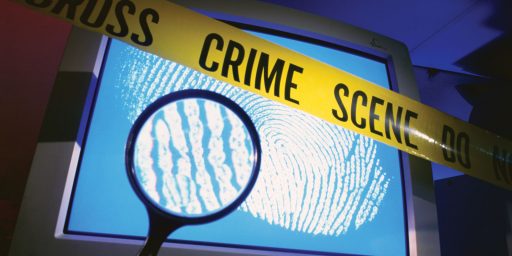Lawsuit Claims Florida Law Accidentally Bans The Internet
A recently filed lawsuit claims that a Florida law meant to regulate online gambling is so overly broad that it effectively bans the Internet in the entire state:
TALLAHASSEE — A South Florida Internet cafe operator, whose clientele is primarily migrant workers seeking computer time, is suing the state, challenging the constitutionality of the Legislature’s ban on illegal slot machines.
The lawsuit filed in Miami-Dade Circuit Court on behalf of Incredible Investments, LLC, owned by Consuelo Zapata, alleges that the Legislature effectively applied the ban to all computers when it defined illegal slot machines as any “system or network of devices” that may be used in a game of chance. The state effectively made every smartphone and computer an illegal device, the plaintiff argues.
“They rushed to judgment and they took what they saw as a very specific problem and essentially criminalized everything,” said Justin Kaplan of the Miami law firm of Kluger, Kaplan, Silverman, Katzen & Levine, which is representing Zapata.
The argument, crafted with the help of constitutional law attorney and Harvard professor Alan Dershowitz, is based on the assumption that the definition of illegal slot machines is now so broad that an illegal game could be potentially played on every computer. Under the law, the Legislature’s own computers, “the ones they used to draft this legislation, are illegal,” Kaplan said.
The case asks the court to throw out the law passed “in a frenzy fueled by distorted judgment in the wake of a scandal that included the lieutenant governor’s resignation.” It argues that the lawsuit unlawfully prohibits, commerce, violates free speech and due process and is overly broad and unworkably vague.
Legislators passed the law after a federal and state investigation into illegal gambling at Internet cafes affiliated with Allied Veterans of the World, a St. Augustine charity organization, led to 57 arrests of people on racketeering and money-laundering charges. Lt. Gov. Jennifer Carroll, who had done consulting work for the veterans group, quickly resigned under pressure.
Since then, an estimated 200 operators of adult arcades, more than 1,000 Internet cafes and hundreds of Miami’s maquinitas have been forced to close down across Florida.
Because the law effectively gives the discretion to the state attorney to decide whom to prosecute under the law, Miami-Dade State Attorney Katherine Fernandez Rundle is the defendant in Zapata’s suit. The legal team — including Dershowitz, who lives part time in Miami Beach — would not say who was paying their fees.
Kaplan said the law’s uneven enforcement violates the constitutional protections of due process. For example, while Zapata is banned from operating her computers under the law, other companies that provide access to the Internet are not. For example, the state could argue that “Starbucks is running illegal slot machines because they provide their customer with a Wi-Fi system that indirectly allows people to gain access to their phone to allow them to play games of chance that allow payouts,” he said.
A similar argument is being made by a coalition of owners of senior video arcades who are orchestrating a series of lawsuits across the state. They argue the prosecutors are engaging in selective enforcement of Florida’s sweeping new ban on video gambling and the law should also be applied to upscale arcade chains such as Dave & Busters and Boomers.
Reading the definition of “slot machine” as it has been redefined in the Florida Code, set forth in the Complaint, it’s easy to see the conclusion that the Plaintiffs are reached for here. The biggest problem,though, isn’t just the broad definition but the broad discretion it grants to prosecutors in deciding who to prosecutor and who to led slide. The prospect that the law will be applied aggressively against businesses that cater to lower income groups like the Plaintiff’s, while other businesses are left to their own devices, seems to be a rather obvious one. At the very least, it seems that the legislature in Florida should go back to the go back to the drawing board on this one.





A poorly worded law that does something other than intended, now I’ve heard everything.
Clearly this legislation is just one more attempt by the State of Florida to get in Al Gore’s face.
This happened less in the olden days when the legislature had a deep bench of coherent congressmen-lawyers.
Although I’m opposed to on-line gambling, I cannot see that this law is anything but a Republican tool to deny the poor. Hopefully, I’m wrong and the situation will be corrected.
The law’s child-like language arose out of a kind of reflexive reaction to Lt. Gov’s resignation after reporting emerged of her involvement as both principal and lobbyist for an internet gaming franchisor. When it was thought she was just a lobbyist it was OK. Greasing the skids were nasty allegations of sexual harassment and conduct in the Lt’s office just preceding the gambling co. revelation.
Actually, the Internet has banned Florida, and I’m going to a party to celebrate that.